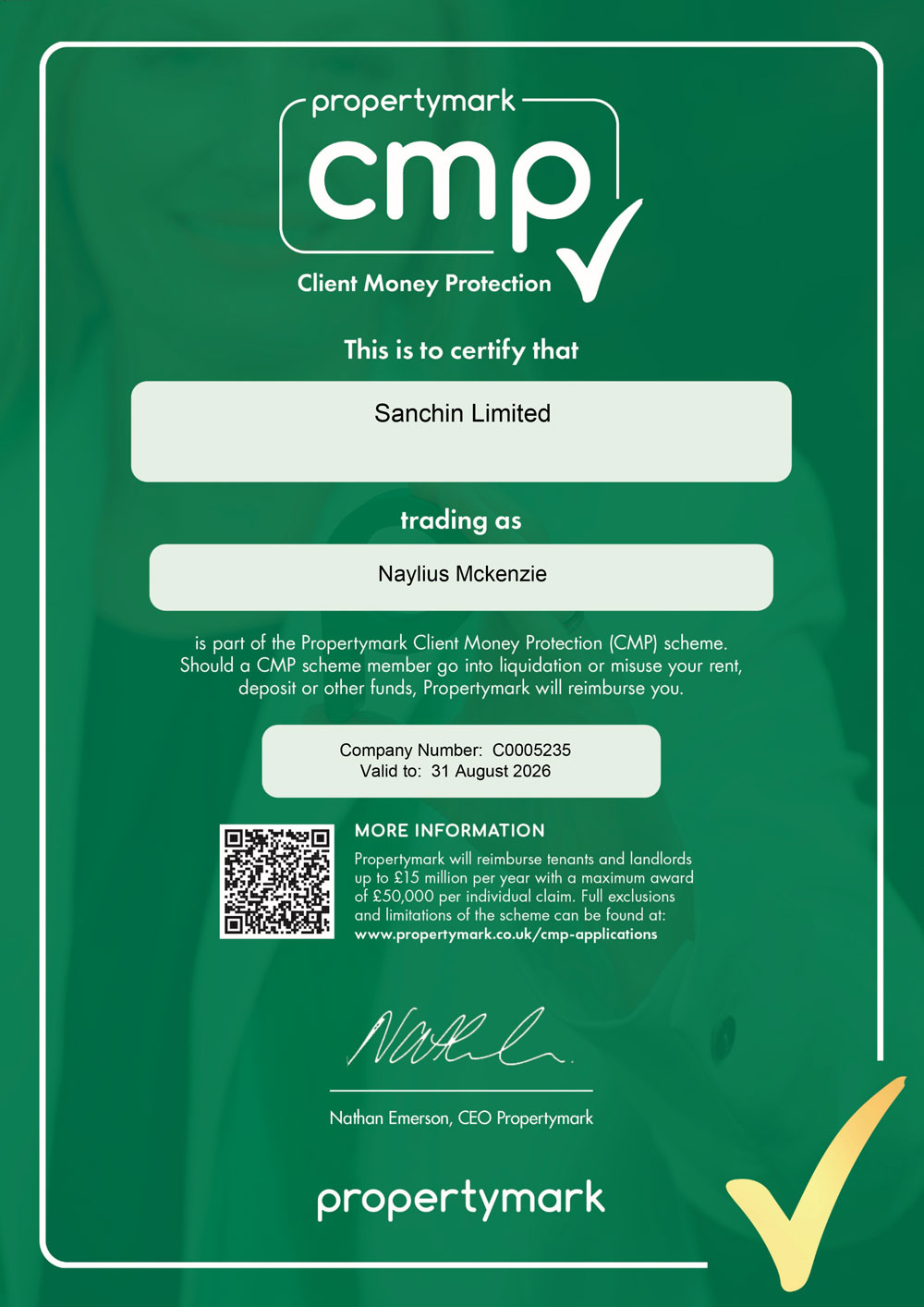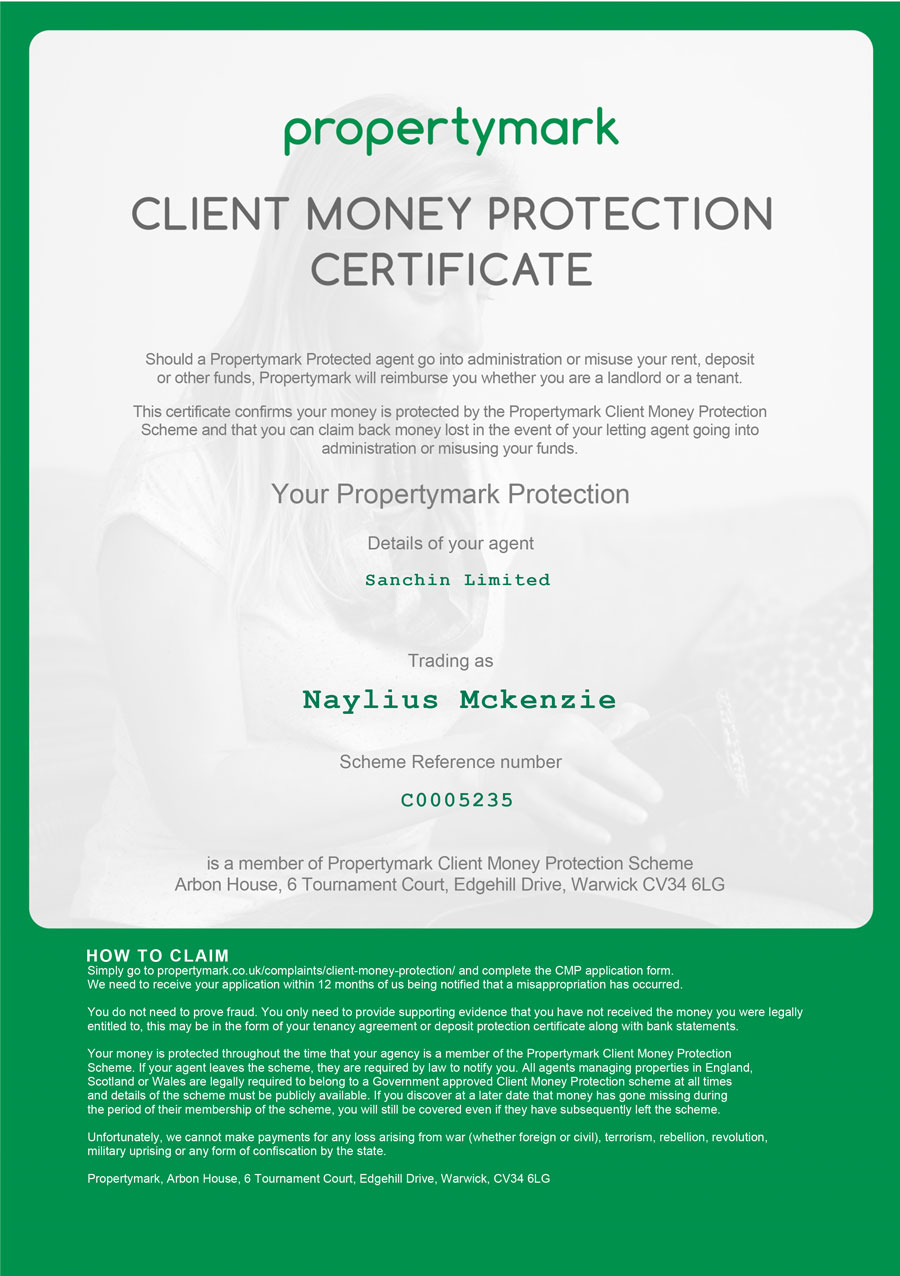Lettings Guide for Landlords
Landlords
Naylius McKenzie Lettings aims to provide the highest standards of professional service to Landlords and Tenants alike. If you are looking to let your property, our dedicated staff will make the entire process as smooth and straightforward as possible.
Good Tenants
Finding good Tenants is paramount to any letting and our company prides itself on finding extremely good tenants on behalf of our Landlords. This is probably one of reasons that we undertake so much repeat business and receive many recommendations. All tenants will be thoroughly credit checked and all references submitted to the Landlord for approval.
Receiving an offer
Once we have received an offer from the tenant we will submit the offer to you for consideration. Any offer made is subject to satisfactory references being received. Once you have accepted the offer, the tenant will pay to Naylius McKenzie a holding deposit, of one weeks rent, we will then obtain the references.
Rent and Deposit
Once satisfactory references have been received, and prior to the commencement of the tenancy, we will collect from the tenant the remaining deposit and the first month's rent. This will include the first rental payment which is one month in advance, and a five week rent deposit, as from 1st June 2019, landlords and agents in England, will be limited to accept a maximum of 5 weeks' deposit (or 6 weeks' if the annual rent is £50,000 or more.
Rent
On the commencement of the Tenancy Agreement Naylius McKenzie will arrange for the tenant to pay the rent direct into your account each month, via standing order. Alternatively we can offer a rent collection service and full property management if required.
Inventory
Before the tenancy begins, an inventory is prepared detailing the contents and condition of the property. This is carried out by an independent inventory clerk and a copy is supplied to both the Landlord and Tenant. The Landlord pays for the inventory before the commencement of the Tenancy. The inventory is there to protect both the Landlord and Tenant, such costs should be seen as a necessary investment that helps protect the interest of both parties.
The Tenancy Agreement
Once all terms have been agreed by both parties and satisfactory references have been received, all documentation is forwarded to you and the Tenant for signature.
Tenants Deposit Scheme
Naylius McKenzie is a member of the Tenancy Deposit Scheme, which is administered by:
The Dispute Service Ltd
PO Box 541
Amersham
Bucks
HP6 6ZR
Phone 0845 226 7837
Email deposits@tds.gb.com
If Naylius McKenzie is instructed by the Landlord to hold the Deposit, Naylius McKenzie shall do so under the terms of the Tenancy Deposit Scheme.
Utilities/Council Tax
Prior to the commencement of the Tenancy Agreement, the landlord must read the meters and inform the utility company and the local authority council that a new tenant is moving in, however if Naylius McKenzie are instructed to manage your property we will deal with this on your behalf.
Taxation for Overseas Landlords
Under the Finance Act 1995, the Inland Revenue introduced a system of self-assessment, and all overseas Landlords may apply to the Inland Revenue for a Certificate of Self-Assessment in order for rents to be paid over gross. We strongly recommend that all overseas Landlords apply for self-assessment. We can, if required, apply to H M Customs & Excise on your behalf. For those who have not applied, Naylius McKenzie is required by law to deduct the tax for all overseas Landlords at the basic rate from the net rental income and pay this on a quarterly basis to the Inland Revenue. At the end of each tax year we will provide you and your accountant with a certificate of tax deducted confirming the amount of tax deducted from the rent and sent on your behalf to H M Customs & Excise.
Energy Performance Certificates (EPC)
It is a legal requirement, all landlords to have a valid EPC for their property before it can be sold or let. An EPC assesses the energy performance of a property, from "A" representing the most energy efficient property to "E" representing the least energy efficient property. It must be carried out by a qualified Domestic Energy Assessor and will also show a building's environmental impact by indicating its carbon dioxide emissions. A valid EPC will last for 10 years.
Repeat Clients
Naylius McKenzie is committed to providing our Landlords with the best possible comprehensive service. We are proud that we continue to serve our Landlords many of whom have happily been with us since we opened in 1989.
Inventory
Before the tenancy begins, an inventory is prepared detailing the contents and condition of the property. This is carried out by an independent inventory clerk and a copy is supplied to both the Landlord and Tenant. The Landlord pays for the inventory before the commencement of the Tenancy. The inventory is there to protect the Landlord and the property and such costs should be seen as a necessary investment.
Important Regulations
There are important furniture and furnishing regulations that relate to the letting of your property and all Landlords must comply. We ensure that you meet your responsibilities under these regulations and arrange all of the necessary safety checks on your behalf.
FURNITURE AND FURNISHINGS (FIRE) (SAFETY) REGULATIONS 1988 AND THE FURNISHINGS (FIRE) (SAFETY) (AMENDMENTS) REGULATIONS 1993
All upholstered furniture manufactured after 1950 (including loose fittings and permanent and loose covers) are included with the Regulations.
There are severe penalties for non-compliance. The offence carries a punishment of up to six months imprisonment and/or a £5,000 fine.
- Furniture in all properties that have been let prior to 1st March 1993 MUST comply fully with the Regulations with effect from the 1st January 1997. However we understand from the Department of Trade and Industry that if a tenancy commenced prior to the 1st January 1997 on a property which was let prior to the 1st March 1993, then the Landlord can continue to supply the original furniture until the tenancy expires; however on a new tenancy the furniture would have to comply fully with the Regulations. We strongly recommend that Landlords should ensure that all furnishings supplied comply fully with the Regulations.
- Furniture in all lettings commenced after 1st March 1993 MUST comply with the Regulations except as set out below in 3.
- A Landlord letting his own property for a 'temporary' period and not in the course of business (defined) has a MORAL but no legal responsibility to ensure the furniture complies.
- Landlords letting a 'second' property or Landlords letting investment property for the first time after 1st March 1993 clearly must comply.
- We confirm that we accept a property onto our books on the understanding that the Landlord has made sure that furnishings supplied comply with these Regulations.
GAS SAFETY REGULATIONS 1994
The new Gas Safety (Installation and Use) Regulations 1994 came into effect on 31st October 1994. Briefly, all gas appliances must be checked for safety at intervals of not more than 12 months and records should be kept in respect of the appliances with the date of inspections, any defect identified and any remedial action taken. A CORGI Registered Engineer must carry out checks and this will include checking the gas installation, associated pipe work and ventilation and supplying a safety certificate.
Electrical equipment must be safe and not cause danger. The 1994 Regulations apply to any person who supplies electrical equipment in the course of a business. Safety of any electrical equipment that is supplied as part of furnished accommodation is controlled by the 1994 Regulations. We advise that electrical equipment is tested at regular intervals.
All new homes must be fitted with mains operated smoke detectors. We would strongly recommend that smoke detectors be fitted in all properties and that they are regularly checked, especially battery operated devices. We would also recommend that carbon monoxide detectors are also installed in properties.
Complaints
ELECTRICAL SAFETY CERTIFICATE
Electrical Safety Certificates will become mandatory for all new tenancies in England from 1st July 2020, and for all existing tenancies on 1st April 2021.
From 1st July 2020 Electrical Installation Condition Reports (EICRs) become mandatory in the private rented sector for new and renewed tenancies in England, and for all existing tenancies on 1st April 2021.
If you create a new tenancy, or renew an existing one, on or after 1st July 2020, you will need a satisfactory EICR. Renewals include tenancies that become statutory periodic at the end of a fixed term on or after 1st July 2020 . All properties in the private rented sector will need an EICR from 1st April 2021.
EICRs now join gas safety certificates and energy performance certificates (EPCs) as legally required documents that must be in place before your tenancy starts or is renewed. There are penalties for non-compliance.
EICRs must be renewed every 5 years, unless your electrician states that it needs to be done sooner.
We recommend you have your EICR completed at least 1 month before it’s required. Many properties require remedial work and, as with a gas safety certificate, you cannot move a tenant in until your EICR has a “satisfactory” rating.
Clients Money Protection
We hold full Client Money Protection and are part of the Propertymark Client Money Protection scheme.


